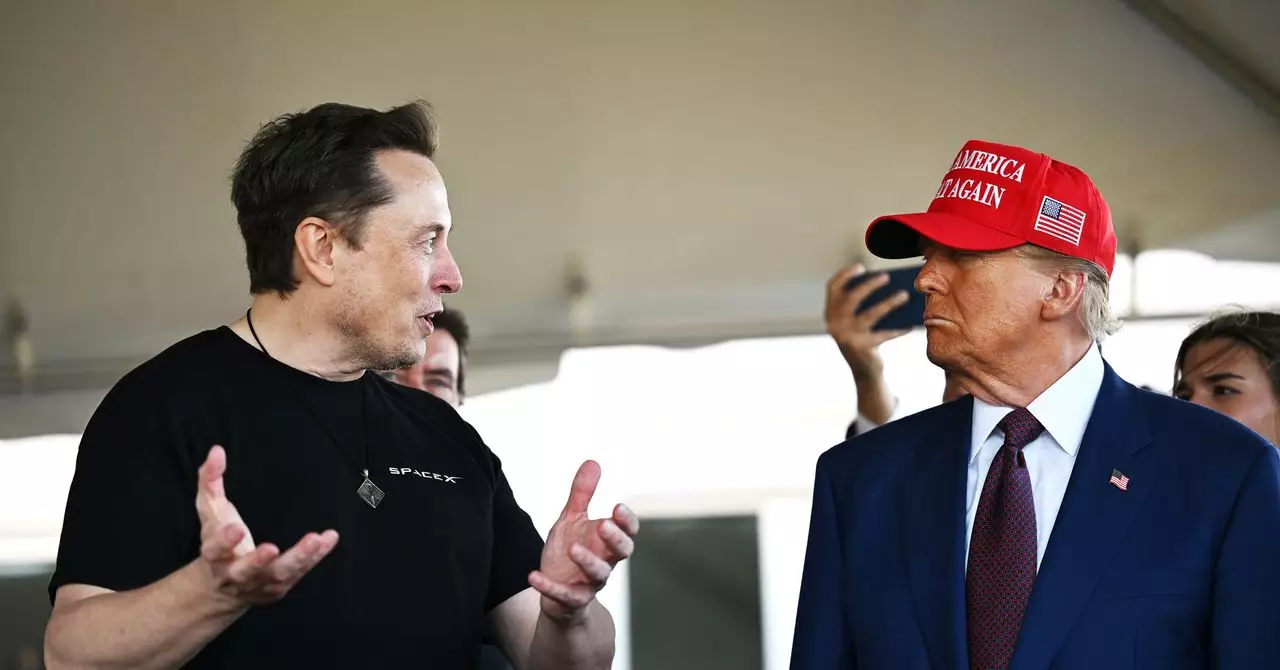The interaction between tech behemoths and political figures has long been inextricably linked, but recent events have illuminated a particularly tumultuous chapter in this narrative. The recent flare-up between Elon Musk and Donald Trump reveals a fracture not only in the relationship between two influential personalities but also underscores a broader dilemma faced by Silicon Valley’s elite. As tech moguls grapple with their political affiliations, they stand at a crossroads, poised between loyalty to innovation and the overarching influence of political ideology.
What is striking about this back-and-forth is the hesitancy displayed by high-profile figures in the tech world. For instance, prominent podcasters and investors Chamath Palihapitiya and Jason Calacanis, despite their traditional alignment with controversial figures, seemed to sidestep direct engagement with the feud. Instead, they redirected conversations towards other topics—cryptocurrency and artificial intelligence policy. While Palihapitiya navigated social media to discuss the volatile state of crypto, a realm that Musk has stirred significantly, Calacanis shared an op-ed about the labyrinthine complexities of AI regulation. These attempts at diversion suggest a wariness of becoming too embroiled in the chaos of polarized politics.
The Cryptic Responses of Tech Leaders
Interestingly, some reactions have been cloaked in metaphor and ambiguity. David Friedberg and Calacanis offered vague yet pointed comments that seem to echo a broader sentiment of disillusionment. Friedberg’s assertion that “China just won,” coupled with Calacanis’ reflections on the transient nature of political alliances, speaks volumes. Such statements reflect not only the frustration within the industry but also an acknowledgment of the shifting geopolitical landscape that tech leaders now find themselves navigating.
Former Tesla product manager Dar Sleeper’s quip about the All In podcast hosts serves as an observation on the fluidity of political identity amid a changing cultural zeitgeist. Gone are the days when allegiance to a figure like Trump or Musk was straightforward; in today’s climate, political loyalties are entangled with business ambitions and ethical considerations. The uncertainty of what follows next in technology—be it breakthroughs or regulatory restraints—will weigh heavily on their affiliations and public stances.
The Disconnect Between Politics and Tech
One significant theme emerging from this discord is the rift between the innovative aspirations of the tech industry and the often-fraught realities of Washington politics. Adam Kovacevich, a former Google executive, touches on a vital point when he suggests that while there may be some appreciation for Trump’s moves against SEC laws and AI regulations, the specter of tariffs looms large. For a majority of tech leaders, this economic pressure will perhaps overshadow any transient political allegiance.
The crucial insight from industry insiders is that the landscape of political support is no longer binary. Within the tech sector, many are sitting on the fence, particularly as the lines blur between traditional party alignment. Those who once gravitated towards Trump may now reconsider their stance, especially if they see Musk, the figurehead of a new digital age, shifting or diluting his political affiliations. In some ways, Musk’s actions could either serve to pull back the more moderate techies to a Democratic alignment or solidify their retreat to the right.
The Surging Influence of New Ideologies
The anxiety that many technologists feel relates to a loss of agency and the desire for political influence. This sentiment is reinforced by the question posed by an anonymous Democratic operative: Can Musk once again become the linchpin that connects Silicon Valley to a left-leaning political ideology? The notions surrounding DOGE and its purported revolutionary potential appears to have faltered, serving as a reminder of how tech aspirations clash against the impenetrable walls of governance.
In the grand tapestry of today’s politics, where technology and governance are tightly woven together, the ideals of innovation clash with corporate interests and political ideologies. With Trump and Musk embroiled in their feud, the attention shifts towards the larger existential questions facing the tech industry. As resentment builds around political decisions that undermine technological progress, the tech elite may find themselves moving beyond simple groupthink and embracing a more nuanced engagement with their political counterparts. It seems that the only certainty in this chaotic landscape is that change is on the horizon, and its implications could redefine the prominence of these influential figures in the political and tech landscapes alike.

